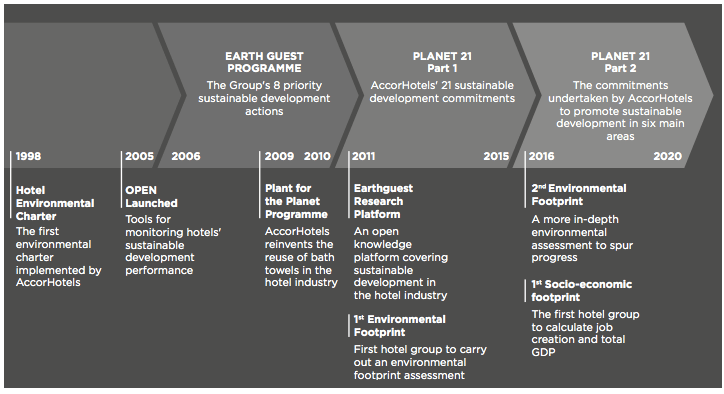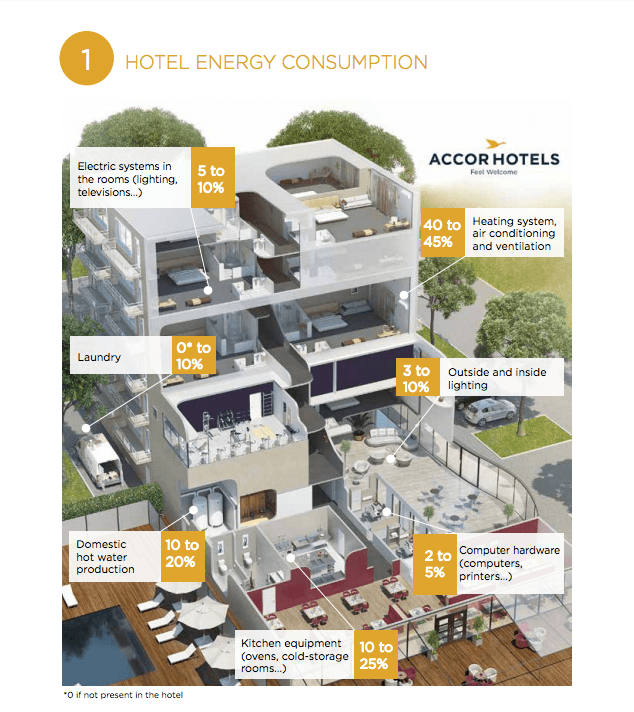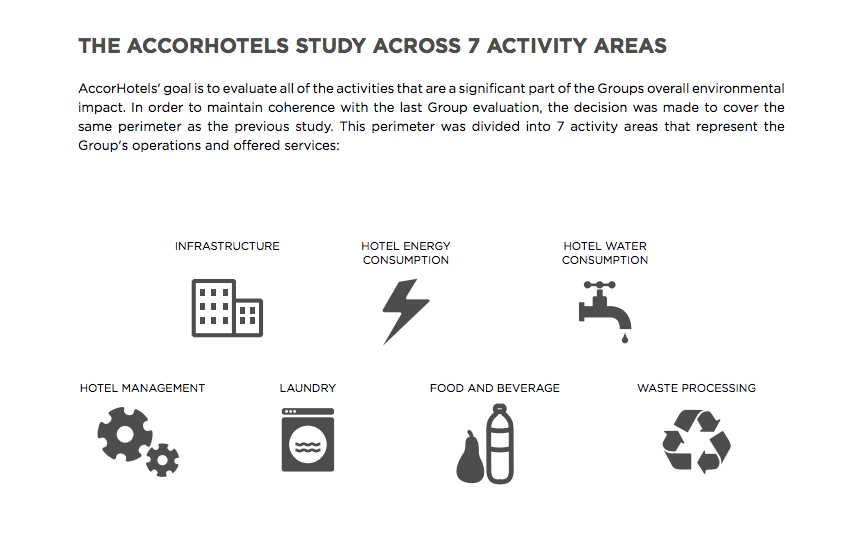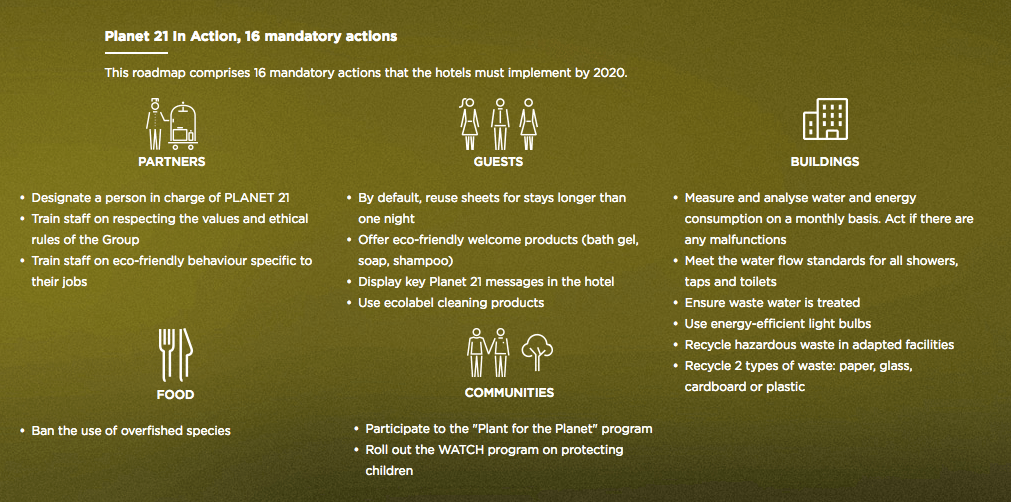AccorHotels: Is growth possible with climate change?

Many have realized that ski cabins in the mountains and #nofilter-worthy beach resorts are suffering the consequences of climate change, but what’s happening to the other hotels?
Hotels and the climate: A complicated relationship
A study by the Organization for Economic Cooperation and Development has found that a one-degree Celsius increase in temperature would mean the closure of 60% of Germany’s ski resorts [1]. This is the obvious impact of climate change, but I’d like to focus on another effect. Hotels are experiencing increasing costs due to climate impact on other industries. For example, lower cotton crops would increase price for bedding thus increasing the cost of that inventory for a hotel. Hotels cannot control those industries nor the scale of impact climate change has on those industries. All they can do is mitigate internally.
AccorHotels: An early player
AccorHotels is a French multinational hotel group operating in 94 countries and managing over 4,000 properties [2]. Although a still-growing brand, AccorHotels was an early player on the environmental stage, setting up an environmental department at the executive level in 1994. Soon afterwards they launched the Accor Hotel Environment Charter outlining sustainability initiatives and have since made strides towards a sustainable future [see figure below, 3].
A good deed leads to a not-so-good surprise
Hotels require energy to operate (think: kitchen and restaurants, laundry services, heating/cooling, pools, etc.; see image below, 3); AccorHotels knew that. To uphold their claim of caring for the Earth and to align with their own charter, they released a transparent report of their energy consumption. That year, their properties consumed just short of 18,000,000 MWh of energy – an amount equivalent to a city of half a million people – which produced almost 2,000,000 tons of carbon dioxide. They also found that they used 544,000,000 cubic meter of water, mostly consumed in the food and beverage operations [4].
Moving from some lessons to a first action
These results were appalling. By going public with the data, the company placed themselves in a position prone to reputational risk. By recognizing the potential of making this a great PR opportunity early, however, AccorHotels got ahead. They began making and advertising changes before industry-wide changes occurred, e.g. the World Tourism Organization implementing stricter guidelines on energy consumption and wastage [5]. By the time other hotels scrambled to get on board, they already achieved compliance to standards.
AccorHotels decided to adapt their model and invest in sustainable solutions to decrease their costs and wastage. One of their first global initiatives was the installation of central LED lighting in all hotel rooms. The executive board asked for 100% penetration of the initiative and asked for detailed tracking of each hotel’s strategic sustainability implementation plan. Within one year, they generated a cost saving of $7 million and a reduction in over 80,000,000 kWh [4].
Going all-in
The results looked good. They advertised viciously as eco-friendly to draw in more guests to help promote sustainability and behind the scenes, worked on large process transformations that would ensure continued energy saving and waste reductions. Between 2011 and 2015, these levers managed to:
- Reduce carbon emission by 6.2%
- Reduce water consumption by 12%
- Implement sustainability tracking in 97% of their properties across hotels’ seven key activities [see image below, 3]
Those four years saw profit increases of 14% to which Mr. Bazin, CEO of AccorHotels, says, “The momentum was driven by the strategic, operational and cultural transformation […] and focused on a sustainable future” [6]. With the rise of the bottom line came the rise in environmental awards and international sustainability certifications. Things were wonderful.
Looking ahead: What now?
Since January 2016, AccorHotels released a 2020-vision with clear actions and processes they intend to put in place to help them onwards on this path-to-sustainability [see image below, 3] and aligned incentives of all parties in the company by pegging management’s compensation with achieving sustainability metric targets.
Investing in sustainability generated profits. If they stopped or changed their eco-friendly stance, they risked losing reputation or worse, have a competitor become leader. There is one concern – sustainability is expensive. Sustainable solutions like the LED light bulbs or a guest option to reuse towels and bedding cost money to implement. Will there come a time when the cost of investment outweighs the savings? Should costs then be passed on to guests? But the hardest question to answer is: will guests actually pay more to save the planet?
My honest opinion is that AccorHotels continue to build and follow their fundamental message of sustainability. I will caveat this with one thing though; with all the changes happening, hotels must not forget that they are a service provider. Ultimately, guests are paying to have swim in heated swimming pools, dine in world-class produce, and sleep on finest linens. As much as sustainability is a noble cause, AccorHotels must continue to live by their tagline, “passion for guests.” Without guests, there is nothing.
(Word count: 798)
[1] Carlson, Paul, “The Hospitality Industry ’s Response to Climate Change: Is the Response Sufficient?” University of Nevada, Las Vegas. Accessed October 2016 <http://digitalscholarship.unlv.edu/cgi/viewcontent.cgi?article=2361&context=thesesdissertations>.
[2] “2011 European Hotel Group Rankings,” HospitalityNet. Accessed October 2016. <http://www.hospitalitynet.org/news/4050555.html>.
[3] “AccorHotels Environmental Footprint Report 2016,” AccorHotels. Accessed October 2016. <http://www.accorhotelsgroup.com/fileadmin/user_upload/Contenus_Accor/Developpement_Durable/pdf/EN/accorhotels_environmental_foot_print_2016.pdf>.
[4] “Accor 2013 Business Review,” AccorHotels. Accessed October 2016. <http://www.accorhotelsgroup.com/uploads/static/ra2013/en/97.html#/pageNumber=1>.
[5] “Global Code of Ethics for Tourism,” WTO. Accessed October 2016. <http://cf.cdn.unwto.org/sites/all/files/docpdf/gcetbrochureglobalcodeen.pdf>.
[6] Response in Press Release from annual financial review 2015. Accessed October 2016 <http://www.accorhotelsgroup.com/fileadmin/user_upload/Contenus_Accor/Finance/Pressreleases/2016/UK/pr_accorhotels_results_2015_vdef.pdf>.
[7] Becken, Susan, “Climate Change and Tourism: From Policy to Practice.” Routledge Publishing, 2012.







Thanks Orianne! Interesting post. I especially liked your question… “will guests actually pay more to save the planet?” You actually took me back to my consulting days, living in a hotel Monday to Thursday. We always stayed at the W hotel in Santiago, which had a green initiative by which it rewarded guests with additional starpoints or discounts if guests accepted to reuse towels and bedding. In my experience, very few people made use of this option – the hotel receptionist confirmed that it was unpopular because customers saw it as the hotel trying to cut corners at the customers’ expense. They eventually rolled back the program.
So in short, I don’t think customers are willing to pay more. They weren’t even willing to take a discount! I must admit I was one of them… if I’m paying +250 $/night, I want a fresh towel.
Orianne, thanks for this interesting piece.
I think Accor’s efforts are commendable, especially with them being the first mover to outline sustainability initiatives and disclose their energy consumption figures. Being the first mover, however, also means that they are naturally putting themselves at a disadvantage. As you rightfully pointed out, sustainable solutions are always expensive to implement. It is hence difficult for Accor to be a thought leader and first mover in championing sustainability efforts – it will always come at an expense. Even if Accor strives to champion sustainability in its industry, Accor is likely only motivated to be incrementally more “sustainable” than its peers, rather than revolutionize sustainability practices in the hospitality industry. Adopting the latter would likely set the company behind against its competitors in the short term, and given the highly competitive nature of the industry, Accor may not even have the opportunity to reap the long-term benefits.
Another point you brought up was that investing in sustainability has generated profits for them. However, I am not sure if their differentiation strategy based on sustainability is alone to recoup the additional expenses incurred to implement sustainability practices. In choosing hotels, other criteria such as location and accessibility are likely to rank ahead of a hotel operator’s sustainability practices.
Based on the aforementioned, to truly revolutionize sustainability practices across the hospitality industry, given the first-mover disadvantages of adopting sustainability practices, more has to be done on industry-wide level to truly effect change.
Great post, Orianne! I’m glad to see that Accor took the initiative to adopt sustainable practices early on… hopefully other hotels will follow. But I echo Josue’s concerns – will customers really pay more to save the planet? Hotel chains are already losing share to AirBnB and other home sharing services. These businesses are considerably more sustainable than hotels since they don’t require maid service, laundry is done less often, and facilities use less energy. Not to mention, AirBnB usually offers accommodations at a fraction of the price as hotels. It’s hard for me to imagine a scenario where hotels can continue innovating in terms of sustainability while incurring the incremental costs. Perhaps they need to do more to find eco-friendly solutions such as working with sustainable suppliers, which can potentially control costs in the long-term. Or, maybe we’ll see hotel chains open more low-frill options that reduce the amount of energy consumed. Overall, I’m curious to see how they can sustain their business (and market share) WHILE adopting these eco-friendly practices.
Thanks Orianne, this post was very thought-provoking! It is interesting to consider to what extent Accor should take it upon themselves to restrict energy consumption by guests vs. putting this onus on the guests themselves – should Accor leave the decision to provide fresh towels/sheets up to the guest or should they have a policy of insisting that towels are reused for a multi-night stay? Should it be an opt in clause or an opt out? The practice of organ donation has shown that in countries with an opt out policy, a greater proportion of the population are registered versus an opt in policy – a staggering 90% vs. 15% (https://sparq.stanford.edu/solutions/opt-out-policies-increase-organ-donation). So perhaps Accor should consider leaving less of this up to the guest?
The balance of responsibility is a difficult one to strike because it can have a real impact on the customer experience and what the guest sees as ‘value’ in their hotel experience – this is clear from Josue’s comment. Will reusing towels as a default option cheapen the experience in the guest’s mind to the extent that they would prefer to stay elsewhere? In a world where there is increasing competition versus cheaper options such as AirBnB, Accor needs to ensure that guests see enough incremental benefit to warrant the relatively higher price tag.